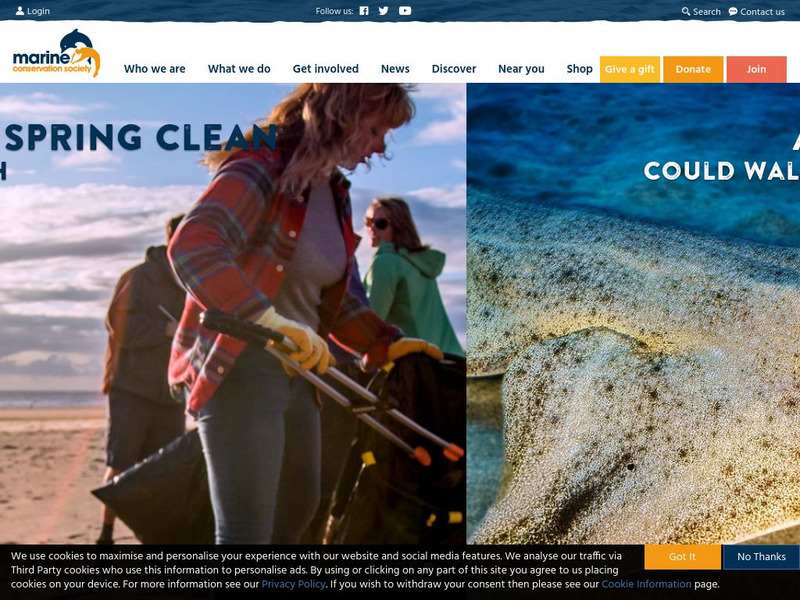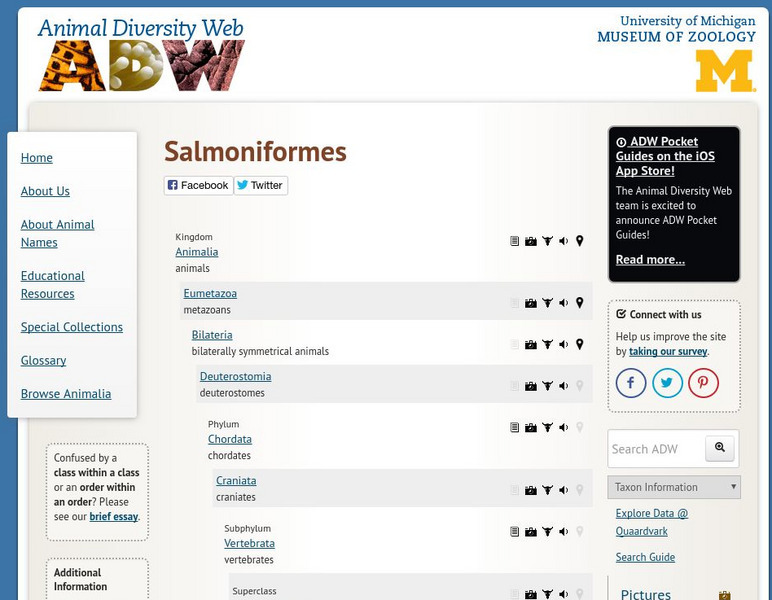Utah Education Network
Uen: Classifying Kids
Classification activity relating to plants and animals.
Other
Illinois Wesleyan University: Tardigrade Species Distribution Project
This was a research project on tardigrades that took place some time ago. The site contains information about the project and about tardigrades, including their taxonomy and a glossary. As this is an older site, the links to the...
Other
Kids' Cruz: Taxonomy
Kidzcruz.com provides a list of phylums in the animal Kingdom. Both Latin and English names are included.
Defenders of Wildlife
Kids' Planet: Who Am I Animals Quiz One
Test your knowledge of the animal kingdom by taking this interactive quiz. Twenty multiple choice questions that offer immediate feedback to responses. If you need help, a link is available to facts about more than 50 animal species.
Untamed Science
Untamed Science: Phylum Chordata
Learn about the characteristics, classification, and phylogeny that make the Phylum Chordata, a distinct animal classification group. See examples and photos of different species of chordates.
Wonderville Media
Animal World/wonderville: Dogs
Dogs have needs just like you. They need food, water, shelter, grooming, exercise, health care, and love. Learn more about dogs in this well-constructed overview by Wonderville.
Other
Science Spot: Classroom Activity: Invertebrate Classification Challenge [Pdf]
Guidelines and printable materials for an activity through which students match invertebrates to phylum in which they belong.
BiologyWise
Biology Wise: Classification and Characteristics of Rotifers
Outlines the classification hierarchy of the phylum Rotifera and describes their characteristics and anatomy. Rotifera have survived for up to 80 million years and continue to play an important role in ecological systems.
University of Illinois
University of Illinois Extension: Urban Text: Adventures of Herman the Worm
WORMS- What are they? Where did they come from? If you are interested in Herman the Worm's family tree (biologically speaking), his body structures, or all the facts about him that you'll ever need, go to "The Adventures of Herman the...
Other
Mcsuk: Seas Fit for Life
In this thorough site, you will find lots of teacher resources including marine environmental issues.
Enchanted Learning
Enchanted Learning: Names of Animals, Babies, and Groups
Do you know what a baby elephant is called? How about the name for a group of gerbils? This site from Enchanted Learning provides information about male, female, baby, and group names of many animals. Click on the animal name to find...
PBS
Nh Pbs: Nature Works: American Black Bear
Learn more about the American Black Bear through this informative resource. Gain a new perspective of this mighty animal when you learn more about its' habitat, behavior, characteristics, and more.
Sea World Parks & Entertainment
Animal Bytes: African Cape Buffalo
Provides users with a concise list of information helpful to anyone wanting to know more about these South African ungulates. Contains scientific classification of these animals, fast facts, fun facts as well as additional information on...
Sea World Parks & Entertainment
Animal Bytes: African Elephant
Resource for anyone seeking information on these huge creatures. Provides scientific classification of African Elephants, fast facts, fun facts as well as additional information on ecology and conservation.
Environmental Education for Kids
Eek!: Leave Animals in the Wild
Discover what you need to know about what makes an animal wild, including the time and energy it takes to keep a wild animal, well, wild.
Other
Mammals and Their Babies
Twelve mammal baby pictures are displayed in this resource. If you roll your mouse over a picture you can see the adult version of the same animal.
Regents of the University of Michigan
Animal Diversity Web: African Buffalo
General reference material on the African, or Cape, buffalo, with information about physical characteristics, geographic range, classification, reproduction, behavior, and habitat.
Sea World Parks & Entertainment
Sea World: Animal Bytes: African Hedgehog
Brief, but concise resource contains helpful information on this little creature. Provides scientific classification of the African hedgehog, fast facts, fun facts as well as additional information on ecology and conservation.
Wikimedia
Wikipedia: Mammal
Wikipedia, an open-source encyclopedia, provides great information on mammals. Content includes a look at mammal characteristics, origins, classification, and more.
Regents of the University of Michigan
Animal Diversity Web: Salmoniformes
A brief overview of the Salmoniformes Order of fish. These fish are very important to humans economically. Many of them are pictured in the photos on this site.
Regents of the University of Michigan
Animal Diversity Web: Class Polychaeta
Resource provides a general description of marine worms, including sand worms, tube worms and clam worms.
Smithsonian Institution
Smithsonian National Zoo: Meet Our Animals
This site from the National Zoological Park provides extensive information about many types of animals. Just click on the category you need. Includes pictures and live web cams.
Biology 4 kids
Biology4 Kids: The Top Four Kingdoms
Read about the four most familiar kingdoms: fungi, plant, animal, and protist.
Science Education Resource Center at Carleton College
Serc: Mn Step: Water Retention No Problem With the Key Investigation
Learners go outside to a nearby pond or wet area, and collect vertebrates and invertebrates. These are identified using a classification key. Information is recorded using a digital camera and a science notebook. Students later prepare a...
Other popular searches
- Classifying Plants and Animals
- Classifying Animal Activity
- Classifying African Animals
- Classifying Utah Animals




















